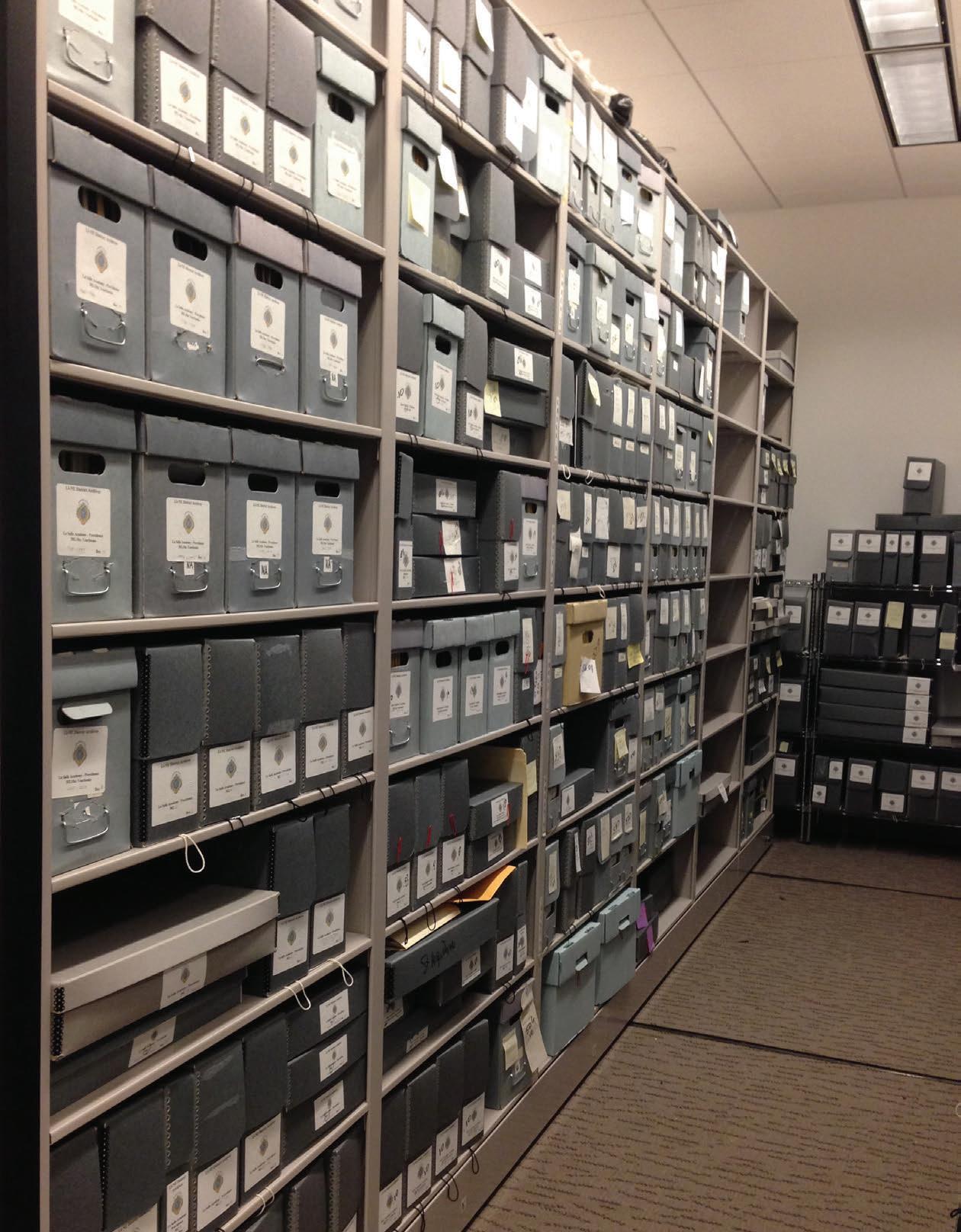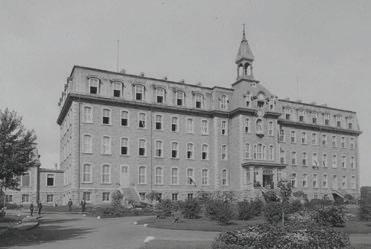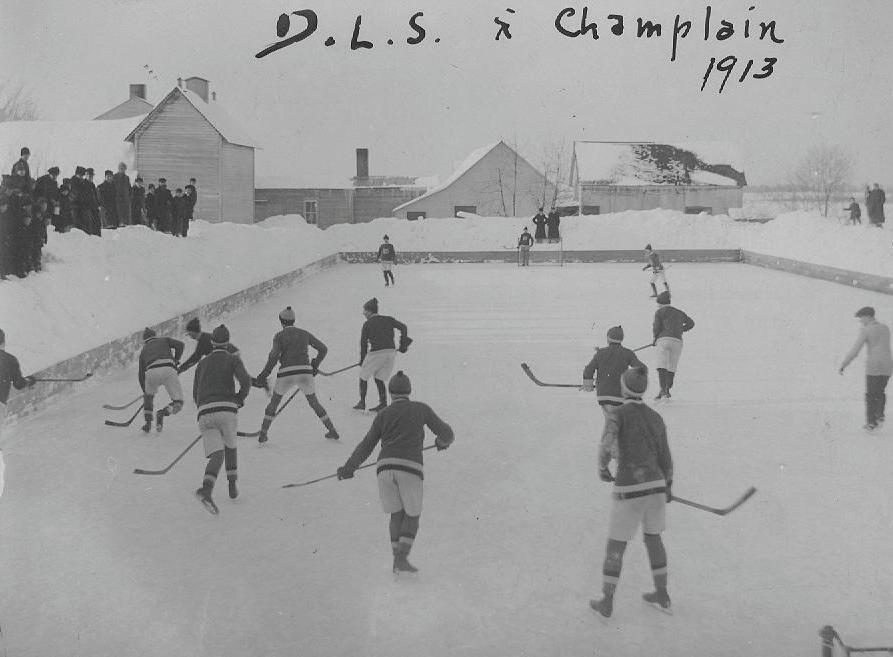
7 minute read
Archives: Treasure Troves of Lasallian History
BY AMY SURAK
In the movie “Chinatown,” Jack Nicholson plays a detective who visits an archive seeking important information to help solve his case. He discovers a vital clue in an old book, surreptitiously tears out the page, and absconds with the document. As an archivist and steward of history whose responsibility is to protect, preserve and share materials that record our cultural heritage down through generations, this scene always makes me cringe.
But it does highlight the fact that archives are invaluable resources that document human experience and serve as society’s collective memory. Archival collections are essential to scholarly research as they help make the past relevant to the present. And it reminds us that these valuable resources serve many constituents including historians, sociologists, genealogists and writers (yes, even detectives), as well as users interested in broader administrative, legal and social topics.

Some may be surprised to learn that the Lasallian world is rich with archival resources. Archivists in the Lasallian Region of North America are hard at work preserving and making available our Lasallian history. The De La Salle Christian Brothers’ archival collections are the result of the activities of the Christian Brothers and the Institute and serve as the recorded memory thereof.
The material nature of the archival record is diverse and endless and is changing rapidly thanks to technology. Collections consist of various forms of recorded information and include documents, books, manuscripts, artwork, photographs, slides, maps, videos, audio recordings, oral histories, digital recordings and ephemera. Yes, we have strange and wonderful objects that range from the bizarre to the sublime (from human bones to Confederate currency, for example). The collections are organically created, accumulated, used and maintained by the Brothers and the Institute and are preserved because of their continuing value.
The Archives constitute a treasure trove for Catholic historians, as well as researchers interested in a broad range of social, urban, ethnic and educational topics. Our collections provide an important and virtually untapped body of material documenting the Catholic Church’s central role in providing charitable, welfare and educational services to American immigrant and working-class citizens. As a new generation of social historians has begun reinterpreting American religious history and recognizing the key role of the Roman Catholic Church in shaping urban culture, collections such as ours will only increase in value and significance. The Archives also contain comprehensive material concerning the interworking of the Institute documenting the founder, General Chapters, District administration and biographical information about the Brothers.

The Archives have gradually been coming together over time. Sharing a physical location does not necessitate any sort of merger, however, and each collection maintains its own autonomy within the archival facility. Each Archive has distinct intellectual needs and serves a unique administrative constituency. At La Salle University in Philadelphia, Pennsylvania, and Manhattan College in Riverdale, New York, for example, Lasallian collections share space with the institutional Archives and benefit from greater integration into the larger academic environment.
Currently, the major North American repositories for Lasallian materials can be found in a handful of locations. At La Salle University, Brother Joseph Grabenstein, FSC, maintains the Archives of the university, the former Baltimore District and the District of Eastern North America. Qualitatively, the collections have excellent strengths. The District collections are rich in publications as well as photographs and ephemera documenting the Districts and its schools, apostolates, missions, communities and Brothers.

On the West Coast, on the beautiful slopes of wine country in Napa, California, at the District of San Francisco New Orleans (SFNO) headquarters, Andrea Miller, Jennifer Sturm and Brother Emmet Sinitiere, FSC, manage the Archives of the District of San Francisco New Orleans; Miller and Sturm manage Archives of the former San Francisco District and Brother Emmet manages the Archives of the former New Orleans-Santa Fe District. With the establishment of the SFNO District, the collections of the former Districts were brought together at Mont La Salle. The San Francisco District collection documents the history of the District, its communities, apostolates and the life and work of the Brothers. According to Miller, the Christian Brothers Winery collection is the most heavily used segment in the Archives, although the winery was sold in 1989. The New Orleans-Santa Fe Archives comprise the records of the two previously separate Districts as well as the combined District. The collections document the experience of the Brothers and the Institute throughout those Districts.
In Canada, Nancy Lavoie manages Archives for the District of Francophone Canada and the former Toronto District in Laval, Québec. The collections are housed in a building that was constructed in 1999 to centralize the Archives. It is an extension of the nursing home, Résidence De La Salle. Before being moved to the new facility, the Archives of the former Districts of Québec and Trois-Rivières were in Québec City, and the archives for the former Districts of Montréal, Longueuil and Ottawa were in Montréal.
At Manhattan College, I oversee the Archives of Manhattan College, the former New York and Long Island-New England Districts and the District of Eastern North America. The college also houses the Lasallian Studies Collection, a research collection of printed works by and about Saint John Baptist de La Salle, the history of the Brothers of the Christian Schools and their educational mission, and writings by and about many of its members. This collection includes more than 6,000 volumes of books, manuscripts, theses, booklets, circulars, pamphlets, cards, newsletters and journals.

Manhattan College also recently acquired the Archives of the Midwest District and Christian Brothers Conference. The Midwest District collection includes material on the first Christian Brothers’ schools in the United States, histories of former Districts, and records of the Brothers, schools, communities and apostolates.
The Conference materials document leadership and programs, such as formation, ministry, education and overseas apostolates, at the Regional level.
SINCE LAST SPRING, ARCHIVISTS HAVE BEEN MIGRATING DESCRIPTIVE INFORMATION ABOUT OUR COLLECTIONS INTO A NEW OPEN SOURCE DATABASE, ARCHIVES SPACE, AN ELECTRONIC ARCHIVAL DESCRIPTION AND COLLECTION MANAGEMENT DATA SYSTEM. THIS PROVIDES INTELLECTUAL ACCESS TO ALL OF OUR ARCHIVAL RESOURCES. WHILE THIS PROCESS IS ONGOING, RESEARCHERS HAVE THE ABILITY TO LOCATE RELEVANT INFORMATION AT ARCHIVESSPACE.MANHATTAN.EDU. IN THE NEAR FUTURE, THIS LINK WILL BE CUSTOMIZED AND AVAILABLE VIA OUR WEBSITES.
Currently, all the Archives have formal access policies that can be found either on their web pages or distributed by the archivists. These stipulate procedures for using our archival material, which include restrictions on certain materials consistent with Institute regulations and relevant federal and local legislation. Researchers are welcome to make an appointment to utilize our collections.








